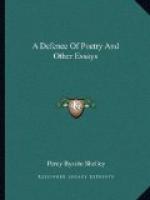[1815; publ. 1840]
SPECULATIONS ON MORALS
I—PLAN OF A TREATISE ON MORALS
That great science which regards nature and the operations of the human mind, is popularly divided into Morals and Metaphysics. The latter relates to a just classification, and the assignment of distinct names to its ideas; the former regards simply the determination of that arrangement of them which produces the greatest and most solid happiness. It is admitted that a virtuous or moral action, is that action which, when considered in all its accessories and consequences, is fitted to produce the highest pleasure to the greatest number of sensitive beings. The laws according to which all pleasure, since it cannot be equally felt by all sensitive beings, ought to be distributed by a voluntary agent, are reserved for a separate chapter.
The design of this little treatise is restricted to the development of the elementary principles of morals. As far as regards that purpose, metaphysical science will be treated merely so far as a source of negative truth; whilst morality will be considered as a science, respecting which we can arrive at positive conclusions.
The misguided imaginations of men have rendered the ascertaining of what is not true, the principal direct service which metaphysical science can bestow upon moral science. Moral science itself is the doctrine of the voluntary actions of man, as a sentient and social being. These actions depend on the thoughts in his mind. But there is a mass of popular opinion, from which the most enlightened persons are seldom wholly free, into the truth or falsehood of which it is incumbent on us to inquire, before we can arrive at any firm conclusions as to the conduct which we ought to pursue in the regulation of our own minds, or towards our fellow beings; or before we can ascertain the elementary laws, according to which these thoughts, from which these actions flow, are originally combined.
The object of the forms according to which human society is administered, is the happiness of the individuals composing the communities which they regard, and these forms are perfect or imperfect in proportion to the degree in which they promote this end.




